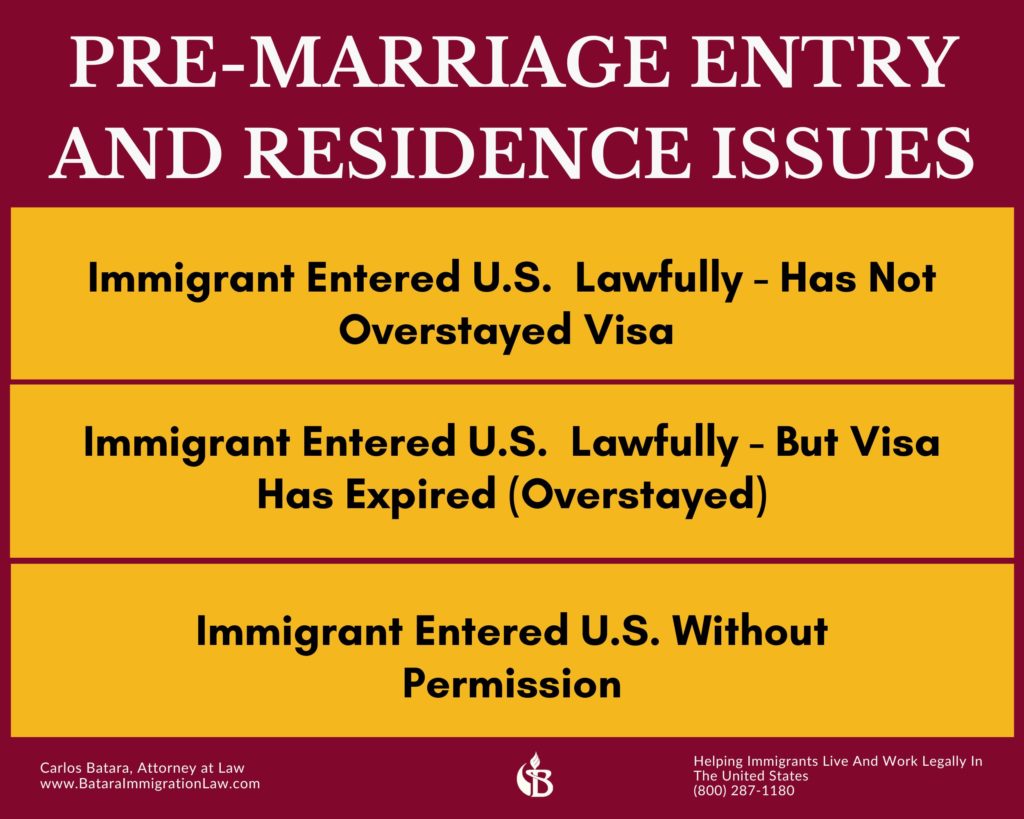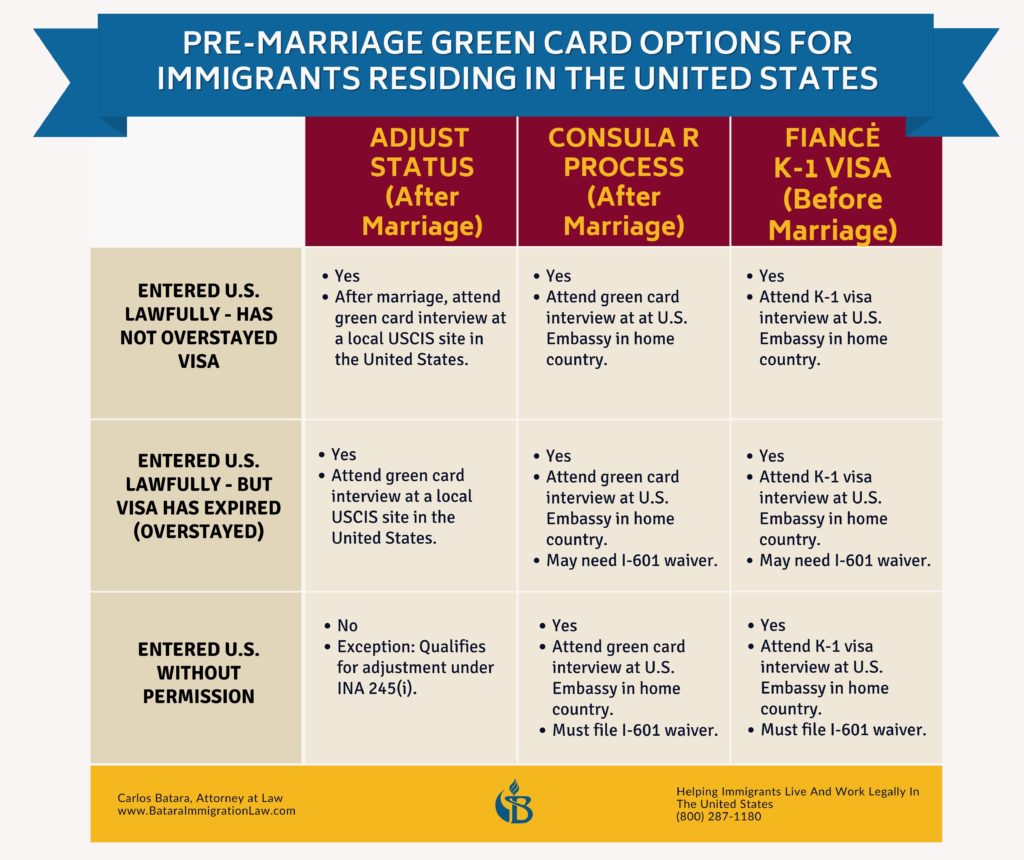
The love genie is out of the bottle.
Since the 1960s, mixed-cultural relationships have become relatively common.
Likewise, over the years, starting with the passage of the Immigration and Nationality Act, slowly but surely, mixed-status immigration romances began to flourish.
Despite the rise in hateful public rhetoric towards individuals born outside the U.S., more and more couples from different cultures, from different countries, fall in love every day.
Love, after all, has no ethnic boundaries. It can and does happen anywhere, at any time.
As a result, the stranglehold of xenophobic political tendencies will eventually give way to rational discourse on immigration policies.
In this article, we’re going to outline what happens when a U.S. citizen falls in love while the immigrant would-be spouse is residing in the United States.
Why Mixed-Status Relationships Should Seek Green Cards With Caution
As a green card lawyer, I’ve met far too many couples from different countries, hoping to spend their lives together, who take the marriage green card process too lightly.
They fall for the fallacy that quick immigration solutions exist, at times due to the advice and encouragement of friends or family members.
Such couples fail to realize that being in love, even deeply in love, is no guarantee of immigration success. They blindly jump into completing government paperwork, filing documents, and paying filing fees prematurely.
Other couples proceed cautiously. After the love bug has bitten, they tread slowly. They carefully prepare to confront the realities of immigration regulations.
To be clear, here are the parameters of our discussion:
(a) The couple is not married. The immigrant is engaged to or thinking about marrying a United States citizen.
(b) The immigrant is residing, at least temporarily, in the United States, not abroad.
(c) How the immigrant arrived and how long she has resided in the U.S.
Editor’s Note
For the sake of simplicity, the examples will focus on the U.S. citizen being a male, and the immigrant being a female. However, the principles discussed below apply equally if the ethnic roles are reversed or if the relationship involves a same-sex couple.
Entry And Residence: Potential Stumbling Blocks In Marriage Green Card Cases
Countless unmarried couples come to my office in the situation outlined above. They want to know how to turn their romance into a marriage that passes immigration muster.
The best path forward differs from couple to couple.
To determine that path, the immigrant’s entry and residence history is crucial:

There are three different pre-marriage green card situations. Each scenario presents varying calculations that couples must make before filing for permanent residence.
- The immigrant entered the United States lawfully, and is still within the term of her non-immigrant visa. It has not expired yet.
- The immigrant entered the United States lawfully, but her visa has expired.
- The immigrant entered the United States without permission.
We are going to go through each scenario one-by-one and discuss the ins and outs of options available to couples in the varying situations.
Pre-Marriage Scenario Number 1:
Immigrant Fiancé Entered United States Lawfully – Has Not Overstayed Visa
We will start our inquiry into pre-marriage green card stumbling blocks with the individual who entered lawfully and whose visa has not yet expired.
They are capable of going forward under what is known as adjustment of status, assuming there is no visa fraud.
This means they entered the U.S. solely for the purpose they declared to the government. If they said they were visiting, they came in as a tourist. If they said they were coming here to study, that is what they did. And so they have not violated the terms.
If they have not violated the terms, then they can qualify to adjust status here in the U.S., without having to leave the country. Once they get married, the immigrant spouse can proceed to an interview for permanent residence at a local immigration office.
The immigrant could also return home, after which the love birds could get married in her home country.
In short, as a couple with mixed status, they are in the best of all possible worlds.
The couple could decide that the immigrant will go back to her home country and they will marry over there. Their paperwork for permanent residence is processed abroad. Or they could get married here before the immigrant goes home, but they complete the permanent resident process abroad.
These possibilities are known as counsular processing. The interview is conducted at a U.S. Embassy. From start to finish, the process will be longer than if the couple utilized the adjustment of status pathway in the United States.
A third option available to this couple is to win a fiancé visa.
Under this alternative, the immigrant could go home, after which the United States citizen would file a fiancé visa petition instead of a marriage petition for his future wife.
Once the petition is approved, the immigrant attends an interview at the Embassy. If she shows she is a legitimate fiancé, in a bona fide relationship, she will be allowed to enter the U.S. for 90 days. During that period, the couple will be required to marry.
After they are married, the immigrant can remain in the U.S. and apply for adjustment of status at a local USCIS office.
In this situation, where the visa has not yet expired, the immigrant and the United States citizen can take advantage of any of those three options.
Pre-Marriage Scenario Number 2:
Immigrant Fiancé Entered United States Lawfully – Visa Has Expired (Overstay)
Let us now talk about the second pre-matrimony situation. The immigrant entered lawfully. But she has overstayed the terms of their visa.
Perhaps she did not leave when their tourist visa ended. Maybe she failed to leave when she finished their schooling.
What are the couple’s options? Can an visa overstay win permanent residence?
Well, so long as there are no other blemishes such as fraud upon entry, it is often possible to apply for adjustment of status here in the United States once they are married.
Similar to the first scenario, unmarried couples could also take advantage of the consular processing and the fiancé visa route.
However, there is a major legal obstacle they must face.
When the immigrant goes back home to their country, how long they have lived in the U.S. becomes significant. If they have been here more than 180 days beyond their authorized stay, they will have to apply for a waiver to return.
She must demonstrate the period of six months or longer of unlawful presence should be excused in the matter of the government’s discretion. This requires winning a 601 waiver, a waiver of inadmissibility. Without an approved waiver, even though they are married and even though the consulate officer believes that it is a legitimate marriage, she will not be allowed re-entry to the United States.
The process will be similar for an overstayer that applies for a fiancé visa. The applicant goes into the interview. The Embassy officer informs the immigrant applicant that she remained in the U.S. longer than permitted. A waiver, again, will be necessary to return.
And to say the least, I-601 waivers are difficult to win.
Pre-Marriage Scenario Number 3:
Immigrant Fiancé Entered United States Without Permission
The third situation unmarried couples face before marriage is where the immigrant spouse-to-be entered without permission.
In most cases, the immigrant will not be able to adjust status here in the United States.
Most of these immigrants have nearly no chance to attend a green card interview locally.
The main exception would be if an immigrant petition was filed on their behalf many ago by a citizen or lawful permanent resident that was approved.
Here’s an example. Several years ago, your father came to the United States to work. He had legal status, and he filed an I-130 petition for you. The petition was approved. But he never followed up. Your permanent residence application was never submitted.
In many cases the approved immigrant relative petition will still be good under the concept of grandfathering. This provision provides that if a petition filed prior to April 30, 2001, on your behalf, was approved, that petition enables you to possibly adjust status here in the United States despite your unlawful entry.

Absent such an exemption, the immigrant will have to return home to apply for a green card under consular processing, and apply for an I-601 waiver.
Tread Carefully: Adjustment Of Status, Consular Processing, Or Fiancé Visa
To recap:
The couple is not married. The petitioner is a United States citizen.
Entry, exit, and admission issues must be examined closely.
First scenario. The immigrant has entered lawfully and is within the terms of her visa. If there are no other blemishes, she can adjust status here in the United States. She can stay here after marriage. They go to an interview at a local USCIS office.
Second scenario. The immigrant entered lawfully but overstayed the visa. The immigrant might be able to adjust status here in the United States. But if she goes back home, she may need to file a hardship waiver.
Third scenario. The immigrant entered unlawfully. Unless there was a petition filed for here in the past or some ground exists that qualifies her to be exempt from the unlawful entry issue, she will have to go home. An I-601 waiver will definitely be necessary.
Sometimes the pre-marriage green card couple has all three options. Other times, they only have one.
Sometimes the immigrant can win permanent residence through an interview at a local immigration office. Other times, she has to return home and file a waiver,
Every situation is different.
Ultimately, the path to permanent residence success depends on the facts of your pre-matrimony entry and residence.
So if you are thinking about getting married and you refuse to let anything get in your way – be careful to choose an option likely to succeed for you and the person you love.
Ready to take a serious and honest look at the strengths and weaknesses of your immigration case? Let’s get started with a personalized strategy and planning session . . .




